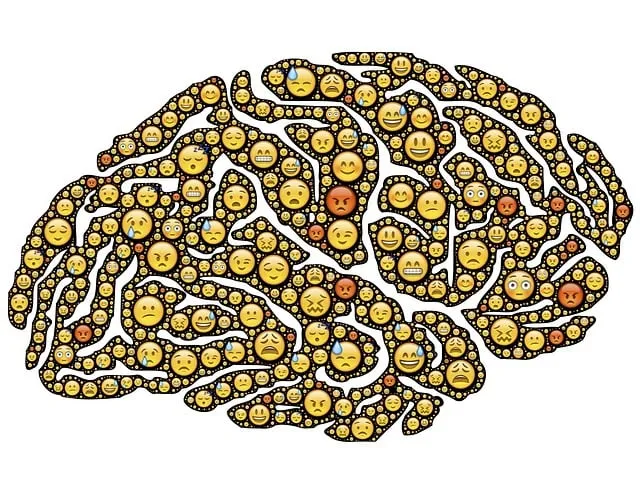Aurora Kaiser Permanente prioritizes understanding diverse community's mental health needs through comprehensive assessments identifying issues like anxiety, depression and stress-related disorders influenced by demographics and culture. They develop tailored interventions incorporating cultural sensitivity for inclusivity. Tools such as the Mental Wellness Podcast Series offer accessible resources promoting mental health awareness among diverse communities served by Aurora Kaiser Permanente. They've significantly evolved mental wellness self-assessment tools, from simple questionnaires to advanced digital platforms that assist individuals in understanding their mental health. By focusing on emotional regulation, coping mechanisms, social connections and self-care practices, these tools provide a holistic view beyond diagnosis. Aurora Kaiser Permanente uses user feedback to refine assessments, integrating cultural sensitivity and universal coping strategies while respecting unique cultural practices.
Mental wellness self-assessment tools play a crucial role in identifying and addressing Aurora Kaiser Permanente mental health needs. This article delves into the development of such tools, starting with an understanding of local mental health landscapes. It reviews existing assessments, identifies key areas for comprehensive evaluation, emphasizes the importance of user-friendly and culturally sensitive design, and highlights the iterative process of integrating feedback for enhanced effectiveness in meeting Aurora Kaiser Permanente members’ unique mental health concerns.
- Understanding Aurora Kaiser Permanente Mental Health Needs
- Existing Self-Assessment Tools: A Review
- Identifying Key Areas for Comprehensive Assessment
- Designing User-Friendly and Culturally Sensitive Measures
- Integrating Feedback and Iterating for Effectiveness
Understanding Aurora Kaiser Permanente Mental Health Needs

Aurora Kaiser Permanente recognizes the diverse and evolving mental health needs within its community. By conducting thorough assessments, they identify prevalent challenges such as anxiety, depression, and stress-related disorders, often influenced by unique demographic factors and cultural backgrounds. This understanding is a cornerstone in developing tailored interventions and support systems that cater to the specific requirements of their patient population.
The organization employs various techniques like Emotional Well-being Promotion Programs and incorporates Cultural Sensitivity in Mental Healthcare Practice to ensure inclusivity and effectiveness. Additionally, they leverage innovative tools like the Mental Wellness Podcast Series Production, offering accessible resources and engaging content to promote mental health awareness and resilience among diverse communities served by Aurora Kaiser Permanente.
Existing Self-Assessment Tools: A Review

The development of mental wellness self-assessment tools has been revolutionized by organizations like Aurora Kaiser Permanente, which has made significant strides in this area. Existing tools range from simple questionnaires to complex digital platforms designed to help individuals gauge their mental health status and identify areas for improvement. These assessments often include questions tailored to common mental health concerns, such as anxiety, depression, stress management, and emotional resilience. For instance, Aurora Kaiser Permanente offers a comprehensive online portal that incorporates various assessment modules covering symptoms, lifestyle factors, and coping strategies.
Many popular tools emphasize the integration of mental wellness journaling exercises, social skills training, and emotional intelligence guidance to provide holistic insights. These assessments cater to diverse demographics, from adolescents to adults, and are designed to be adaptable based on individual needs. By leveraging these existing resources, researchers and practitioners can build upon established frameworks, ensuring that new self-assessment tools remain effective and accessible while incorporating the latest advancements in mental health care.
Identifying Key Areas for Comprehensive Assessment

When developing a self-assessment tool for mental wellness, it’s crucial to identify key areas that encompass holistic psychological well-being. Aurora Kaiser Permanente mental health services often emphasize the importance of assessing not just symptoms but also the individual’s capacity to navigate life challenges. This involves delving into various dimensions such as emotional regulation, coping mechanisms, social connections, and self-care practices. By considering these aspects, the assessment tool can provide a comprehensive view of an individual’s mental wellness, going beyond mere diagnosis.
For instance, incorporating modules focused on Social Skills Training and Resilience Building within the assessment can offer valuable insights into how individuals interact with their environment and cope with adversity. Evaluating Self-Care Practices is another critical component as it reveals an individual’s ability to maintain balance in their daily lives. Tailoring self-assessment tools to include these areas ensures that users gain a deeper understanding of their mental health status, empowering them to take charge of their well-being.
Designing User-Friendly and Culturally Sensitive Measures

Developing mental wellness self-assessment tools that are user-friendly and culturally sensitive is a critical step in ensuring effective support for diverse populations. Aurora Kaiser Permanente’s approach emphasizes the importance of creating measures that are accessible and relevant to individuals from various cultural backgrounds. This involves incorporating principles of Inner Strength Development, as recognizing and nurturing inner resilience is key to fostering mental wellness across cultures.
Cultural sensitivity in these tools is achieved through rigorous research and consultation with healthcare providers who have undergone Cultural Competency Training. By understanding the nuances of different cultural perspectives on mental health, the assessment can be tailored to avoid stereotypes and biased assumptions. For instance, incorporating aspects of Mindfulness Meditation as a universal coping strategy acknowledges the power of mindfulness across diverse communities while respecting unique cultural practices. This inclusive design ensures that the self-assessment resonates with individuals from all walks of life, fostering open dialogue about mental wellness.
Integrating Feedback and Iterating for Effectiveness

Integrating feedback is a critical step in developing effective mental wellness self-assessment tools, such as those offered by Aurora Kaiser Permanente. By collecting and analyzing user input, developers can identify areas that require improvement or refinement. This iterative process ensures that the tools remain relevant and aligned with the evolving needs of individuals seeking mental health support.
For instance, incorporating feedback from users who find certain aspects challenging or confusing can lead to the implementation of more intuitive interfaces and clearer communication. Additionally, positive thinking exercises and self-awareness activities that resonate well with users can be enhanced or expanded upon. Stress reduction methods suggested by users can also guide the inclusion of new features designed to alleviate mental health challenges.
The development of effective mental wellness self-assessment tools, as demonstrated by the review of existing resources and the identified key areas for comprehensive assessment, is vital for addressing the unique mental health needs of communities, such as those served by Aurora Kaiser Permanente. By designing user-friendly and culturally sensitive measures, we can ensure these tools are accessible and impactful. Integrating feedback from diverse users and continuously iterating based on effectiveness ensures that these assessments remain relevant and beneficial in promoting mental wellness.






